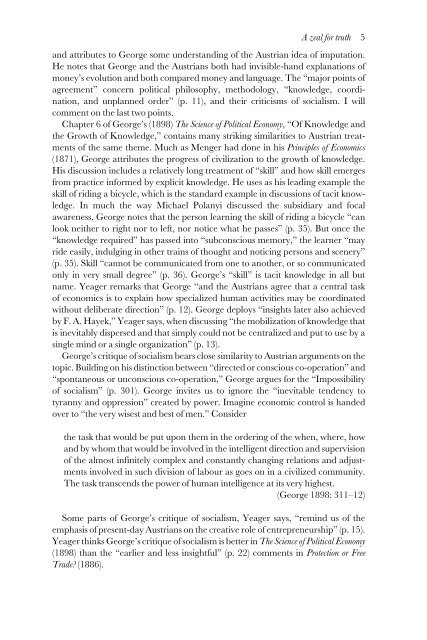Money and Markets: Essays in Honor of Leland B. Yeager
Money and Markets: Essays in Honor of Leland B. Yeager
Money and Markets: Essays in Honor of Leland B. Yeager
Create successful ePaper yourself
Turn your PDF publications into a flip-book with our unique Google optimized e-Paper software.
A zeal for truth 5<strong>and</strong> attributes to George some underst<strong>and</strong><strong>in</strong>g <strong>of</strong> the Austrian idea <strong>of</strong> imputation.He notes that George <strong>and</strong> the Austrians both had <strong>in</strong>visible-h<strong>and</strong> explanations <strong>of</strong>money’s evolution <strong>and</strong> both compared money <strong>and</strong> language. The “major po<strong>in</strong>ts <strong>of</strong>agreement” concern political philosophy, methodology, “knowledge, coord<strong>in</strong>ation,<strong>and</strong> unplanned order” (p. 11), <strong>and</strong> their criticisms <strong>of</strong> socialism. I willcomment on the last two po<strong>in</strong>ts.Chapter 6 <strong>of</strong> George’s (1898) The Science <strong>of</strong> Political Economy, “Of Knowledge <strong>and</strong>the Growth <strong>of</strong> Knowledge,” conta<strong>in</strong>s many strik<strong>in</strong>g similarities to Austrian treatments<strong>of</strong> the same theme. Much as Menger had done <strong>in</strong> his Pr<strong>in</strong>ciples <strong>of</strong> Economics(1871), George attributes the progress <strong>of</strong> civilization to the growth <strong>of</strong> knowledge.His discussion <strong>in</strong>cludes a relatively long treatment <strong>of</strong> “skill” <strong>and</strong> how skill emergesfrom practice <strong>in</strong>formed by explicit knowledge. He uses as his lead<strong>in</strong>g example theskill <strong>of</strong> rid<strong>in</strong>g a bicycle, which is the st<strong>and</strong>ard example <strong>in</strong> discussions <strong>of</strong> tacit knowledge.In much the way Michael Polanyi discussed the subsidiary <strong>and</strong> focalawareness, George notes that the person learn<strong>in</strong>g the skill <strong>of</strong> rid<strong>in</strong>g a bicycle “canlook neither to right nor to left, nor notice what he passes” (p. 35). But once the“knowledge required” has passed <strong>in</strong>to “subconscious memory,” the learner “mayride easily, <strong>in</strong>dulg<strong>in</strong>g <strong>in</strong> other tra<strong>in</strong>s <strong>of</strong> thought <strong>and</strong> notic<strong>in</strong>g persons <strong>and</strong> scenery”(p. 35). Skill “cannot be communicated from one to another, or so communicatedonly <strong>in</strong> very small degree” (p. 36). George’s “skill” is tacit knowledge <strong>in</strong> all butname. <strong>Yeager</strong> remarks that George “<strong>and</strong> the Austrians agree that a central task<strong>of</strong> economics is to expla<strong>in</strong> how specialized human activities may be coord<strong>in</strong>atedwithout deliberate direction” (p. 12). George deploys “<strong>in</strong>sights later also achievedby F. A. Hayek,” <strong>Yeager</strong> says, when discuss<strong>in</strong>g “the mobilization <strong>of</strong> knowledge thatis <strong>in</strong>evitably dispersed <strong>and</strong> that simply could not be centralized <strong>and</strong> put to use by as<strong>in</strong>gle m<strong>in</strong>d or a s<strong>in</strong>gle organization” (p. 13).George’s critique <strong>of</strong> socialism bears close similarity to Austrian arguments on thetopic. Build<strong>in</strong>g on his dist<strong>in</strong>ction between “directed or conscious co-operation” <strong>and</strong>“spontaneous or unconscious co-operation,” George argues for the “Impossibility<strong>of</strong> socialism” (p. 301). George <strong>in</strong>vites us to ignore the “<strong>in</strong>evitable tendency totyranny <strong>and</strong> oppression” created by power. Imag<strong>in</strong>e economic control is h<strong>and</strong>edover to “the very wisest <strong>and</strong> best <strong>of</strong> men.” Considerthe task that would be put upon them <strong>in</strong> the order<strong>in</strong>g <strong>of</strong> the when, where, how<strong>and</strong> by whom that would be <strong>in</strong>volved <strong>in</strong> the <strong>in</strong>telligent direction <strong>and</strong> supervision<strong>of</strong> the almost <strong>in</strong>f<strong>in</strong>itely complex <strong>and</strong> constantly chang<strong>in</strong>g relations <strong>and</strong> adjustments<strong>in</strong>volved <strong>in</strong> such division <strong>of</strong> labour as goes on <strong>in</strong> a civilized community.The task transcends the power <strong>of</strong> human <strong>in</strong>telligence at its very highest.(George 1898: 311–12)Some parts <strong>of</strong> George’s critique <strong>of</strong> socialism, <strong>Yeager</strong> says, “rem<strong>in</strong>d us <strong>of</strong> theemphasis <strong>of</strong> present-day Austrians on the creative role <strong>of</strong> entrepreneurship” (p. 15).<strong>Yeager</strong> th<strong>in</strong>ks George’s critique <strong>of</strong> socialism is better <strong>in</strong> The Science <strong>of</strong> Political Economy(1898) than the “earlier <strong>and</strong> less <strong>in</strong>sightful” (p. 22) comments <strong>in</strong> Protection or FreeTrade? (1886).
















